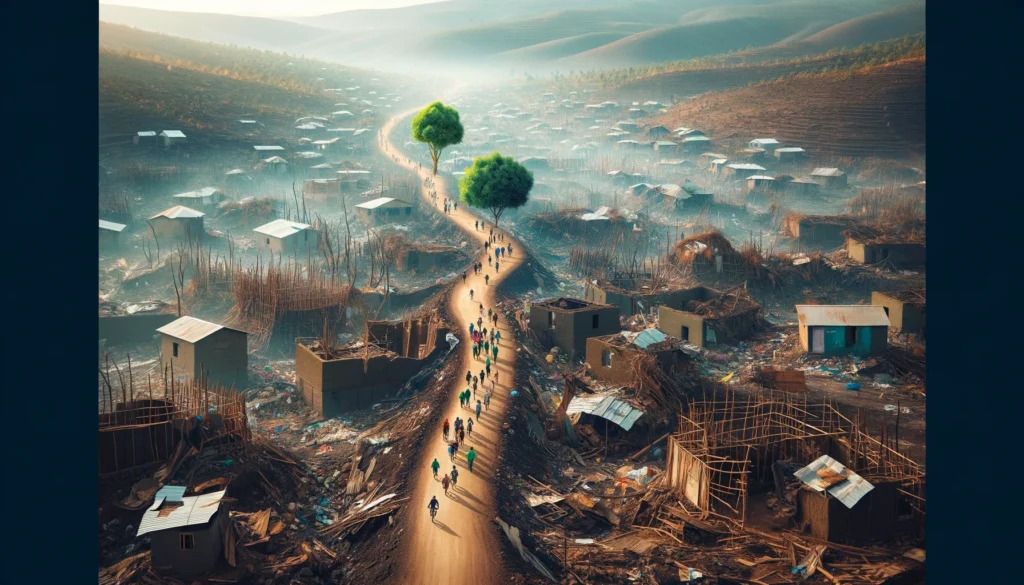
Ethiopia’s Crisis Unveiled: Human Rights Violations and the Quest for Peace in Amhara
By Darius Spearman (africanelements)
Support African Elements at patreon.com/africanelements and hear recent news in a single playlist, plus get early access to ad-free video content.
Introduction to Human Rights Violations and Conflict in Ethiopia
Ethiopia is currently facing a severe crisis characterized by human rights violations and escalating conflicts, particularly in the Amhara region. Security forces in Ethiopia have been implicated in extrajudicial killings, arbitrary detentions, and the burning of homes. These actions have sparked international concern and outcry. Moreover, they have unfolded in the shadow of inter-communal violence and armed attacks, further complicating the nation’s path to peace and stability. Organizations like Amnesty International have stepped forward, demanding accountability. Further, the organization urges the Ethiopian government to respect human rights. This article delves into the depths of the conflict, exploring its roots, the demands for justice, and the fervent calls for a peaceful resolution.
Conflict and Human Rights Violations in Ethiopia
Ethiopia’s security forces have committed severe human rights violations. These actions include extrajudicial killings, arbitrary detentions, and the torching of homes. They have responded with these measures in reaction to inter-communal violence and armed attacks. Furthermore, these violations have sparked outrage and demands for justice (SOURCE: Ethiopia: Security forces ‘must face justice for horrific human rights violations’ – New Report).
In the Amhara region, a tragic series of events unfolded. The Liyu police, local administration militia, and Amhara youth vigilante groups launched attacks on the Qimant community. Consequently, these attacks resulted in over 100 deaths and forced hundreds to flee their homes. Meanwhile, in Oromia, the situation grew increasingly dire. Security forces extrajudicially executed at least 39 people. Additionally, they arbitrarily arrested and detained more than 10,000 individuals as part of the government’s crackdown on armed attacks.
Amnesty International’s Call for Accountability and Access
Amnesty International has stepped forward with a critical demand. The organization insists that the Ethiopian government must allow independent investigators and media into the Amhara region. This access aims to facilitate investigations into allegations of gross human rights violations. Moreover, this step is crucial for ensuring transparency and accountability (SOURCE: Ethiopia: Authorities must give investigators and journalists access to Amhara region under a state of emergency).
“The sweeping state of emergency gives the Ethiopian government unchecked powers while internet blockages make it harder to monitor the situation in Amhara region.” (SOURCE: Ethiopia: Authorities must give investigators and journalists access to Amhara region under a state of emergency).
In addition to demanding access, Amnesty International has called upon Ethiopian authorities to uphold human rights. They urge the government to end impunity and guarantee fair trials for those accused of crimes. This appeal underscores the importance of justice and the rule of law in resolving conflicts and preventing further human rights abuses.
Background and Roots of the Conflict
Tensions in the Amhara region have deep roots. The conflict stems from disputes between the Fano militia and the Ethiopian Defense Force. These tensions have intensified following the Post-Pretoria agreement between Prime Minister Abiy Ahmed and the Tigray People’s Liberation Front (TPLF). As a result, Fano fighters feel betrayed by the government, especially after their alliance against the TPLF in earlier confrontations (SOURCE: Dembecha: heavy fighting between Fano, Ethiopian Defense Force).
Another flashpoint in the conflict is the transfer of Welkait. This region, annexed by the TPLF in 1991 and part of Gondar, was transferred to TPLF administration. This decision further escalated tensions and contributed to the current unrest. Such moves have not only deepened divisions but also exacerbated the violence, underscoring the complex historical and political factors at play.
Calls for Peaceful Resolution and Accountability
The African Union and the Patriarch of the Ethiopian Orthodox Church have made their voices heard. They call for a peaceful resolution to the conflict in the Amhara region. Such appeals highlight the widespread desire for an end to violence and a constructive dialogue to address the underlying issues. These calls underscore the importance of peace and stability in the region.
Amnesty International has also emphasized the need for dialogue and accountability. The organization stresses that the government must engage in meaningful conversations to address the root causes of the conflict. By doing so, it can prevent further violence and human rights violations. This approach is vital for ensuring a lasting peace and respect for human rights in Ethiopia.
Conclusion: The Path Forward for Ethiopia
As Ethiopia grapples with the aftermath of severe human rights violations and the ongoing conflict in the Amhara region, the calls for peace, dialogue, and accountability grow louder. The international community, led by entities such as the African Union and Amnesty International, emphasizes the need for the Ethiopian government to engage in meaningful dialogue and address the underlying causes of the conflict. Achieving a peaceful resolution and ensuring justice for the victims of these violations are imperative steps towards rebuilding trust. Such steps are necessary to ensure a stable future for all Ethiopians. The road ahead is fraught with challenges, but with concerted efforts towards accountability and dialogue, Ethiopia can pave the way for lasting peace and respect for human rights.
About the author: Darius Spearman is a professor of Black Studies at San Diego City College, where he has been pursuing his love of teaching since 2007. He is the author of several books, including Between The Color Lines: A History of African Americans on the California Frontier Through 1890. You can visit Darius online at africanelements.org.
